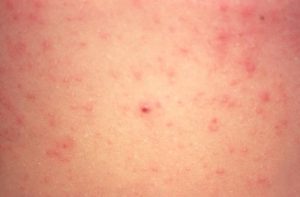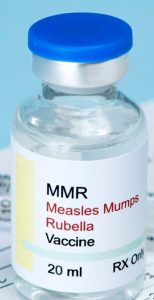NewsDesk @bactiman63
Last week, the Centers for Disease Control and Prevention (CDC) issued a health advisory to remind clinicians and public health officials to provide guidance for measles prevention to international travelers and to be on alert for cases of measles.
 As of June 8, 2023, CDC has been notified of 16 confirmed U.S. cases of measles across 11 jurisdictions, with 14 (88%) linked to international travel. This is an increase compared to the 3 cases in 2022 during the same period.
As of June 8, 2023, CDC has been notified of 16 confirmed U.S. cases of measles across 11 jurisdictions, with 14 (88%) linked to international travel. This is an increase compared to the 3 cases in 2022 during the same period.
Large and disruptive measles outbreaks (≥20 reported measles cases per million population during a 12-month period) have been reported in the European, African, Eastern Mediterranean, Western Pacific, and Southeast Asian regions during 2023.
To prevent measles infection and spread from importation, all U.S. residents should be up to date on their MMR vaccinations, especially prior to international travel regardless of the destination.
Declines in measles vaccination rates globally during the COVID-19 pandemic have increased the risk of larger measles outbreaks worldwide, including in the United States.
- CDC recommends that all U.S. residents older than age 6 months who will travel internationally, without evidence of immunity, receive MMR vaccine prior to departure.
- Infants 6 through 11 months of age should receive one dose of MMR vaccine before departure. Infants who receive a dose of MMR vaccine before their first birthday should receive two more doses of MMR vaccine, the first of which should be administered when the child is 12 through 15 months of age and the second at least 28 days later.
- Children 12 months of age or older should receive two doses of MMR vaccine, separated by at least 28 days.
- Teenagers and adults without evidence of measles immunity should have documentation of two doses of MMR vaccine separated by at least 28 days.
- At least one of the following is considered evidence of measles immunity for international travelers: 1) birth before 1957, 2) documented administration of two doses of live measles virus vaccine (MMR, MMRV, or other measles-containing vaccine), or 3) laboratory (serologic) proof of immunity or laboratory confirmation of disease.
Dr. Sharon Nachman, chief of the Division of Pediatric Infectious Diseases at Stony Brook Children’s Hospital, says “Measles is highly contagious. Breathing the air of a room where someone with measles was in (even if they are not still in it) will result in an individual getting this infection. Think about all the public places you and your family go this summer. People are traveling more – and may visit a country where measles is still a problem. Today expecting community protection is no longer reasonable with the current levels of community vaccination for measles.”
How contagious is measles?

Very. The measles virus is spread through the air, can travel more than 60 feet and can live in a room for several hours. Now that the weather is nicer, people are getting out more and having contact with others. This means there is more likelihood that additional cases will be seen.
Even if you have been exposed, if you get the vaccine quickly, you may be able to avoid coming down with measles. But you should call your doctor first – don’t just show up at the office or at an urgent care facility – because you could end up exposing everyone in the waiting room.
Is measles dangerous?
Yes. While some people may have mild symptoms, others can have severe or even life-threatening ones. These include measles, pneumonia and measles encephalitis. One particularly disturbing consequence of contracting measles at a young age can be the development of subacute sclerosing panencephalitis (SSPE). This progressive neurological disorder of children and young adults affects the central nervous system. Patients develop a severe brain infection six to 10 years after having measles, which can lead to profound mental and physical deterioration and eventually coma and death. It is estimated that 1 in 500 to 1 in 1,000 children who had measles will develop SSPE.
Subscribe to Outbreak News TV on YouTube
What are the symptoms?
People with measles may have initial symptoms that are typical of many viral illnesses such as irritability, cough, runny nose and conjunctivitis. They are already highly infectious to others at this time. The rash people generally associate with the disease starts on the head and spreads down through the trunk of the body, usually at the peak of respiratory symptoms (two weeks after exposure), about three days into illness. In other words, well before the rash appears, people in contact with the sick person may have already been exposed.
Is the measles vaccine truly safe?

Yes. The measles vaccine is actually a combination vaccine, called MMR, covering measles, mumps and rubella (German measles). It’s considered very safe and, when administered according to the schedule recommended by the Advisory Committee on Immunization Practices (ACIP), can provide 97 percent protection from measles.
It’s also important to note that there are no and never have been preservatives, such as thimerosal, a mercury-based preservative, in the MMR vaccine. A widespread myth is that some ingredients in vaccines cause autism. However, multiple scientific studies have shown no link between any vaccine ingredient and autism.
- Bangladesh reports 399 additional dengue hospitalizations, Brings annual total to over 7,000
- Denmark H5N1 avian influenza: Mass deaths among Danish hooded gulls have been recorded throughout the country since May
- Costa Rica officials report the presence of Listeria monocytogenes in fresh cheeses of various brands
- Schistosomiasis and soil transmitted helminths in Brazil
- Texas reports locally acquired malaria case
- France: 40 new brucellosis cases declared in 2022
- Israel reports monkeypox case, 1st case in months

